外研高一必修3 Module 5 Great people and Great Invention模块复习课件(60张)
文档属性
| 名称 | 外研高一必修3 Module 5 Great people and Great Invention模块复习课件(60张) |
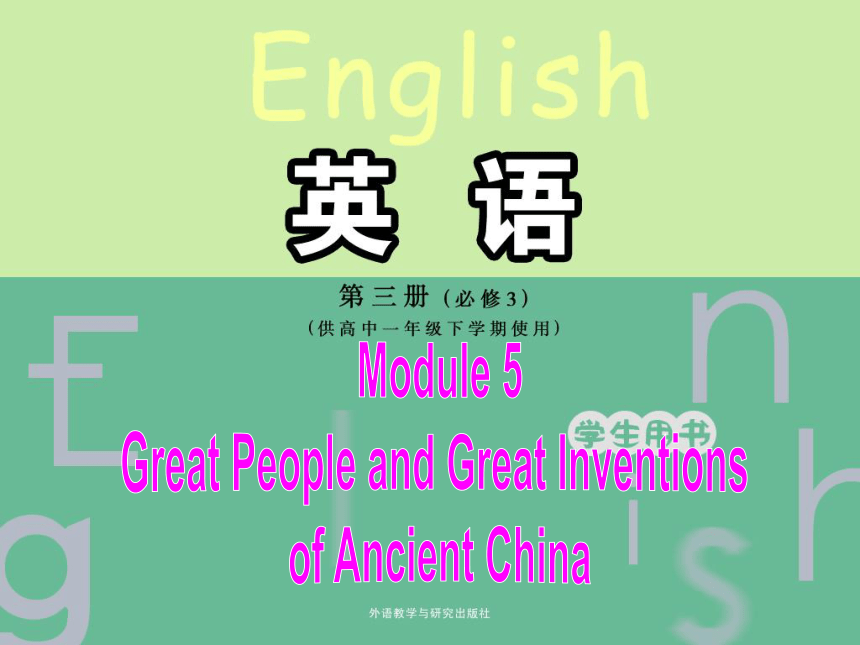
|
|
| 格式 | zip | ||
| 文件大小 | 462.3KB | ||
| 资源类型 | 教案 | ||
| 版本资源 | 外研版 | ||
| 科目 | 英语 | ||
| 更新时间 | 2017-01-18 00:00:00 | ||
图片预览

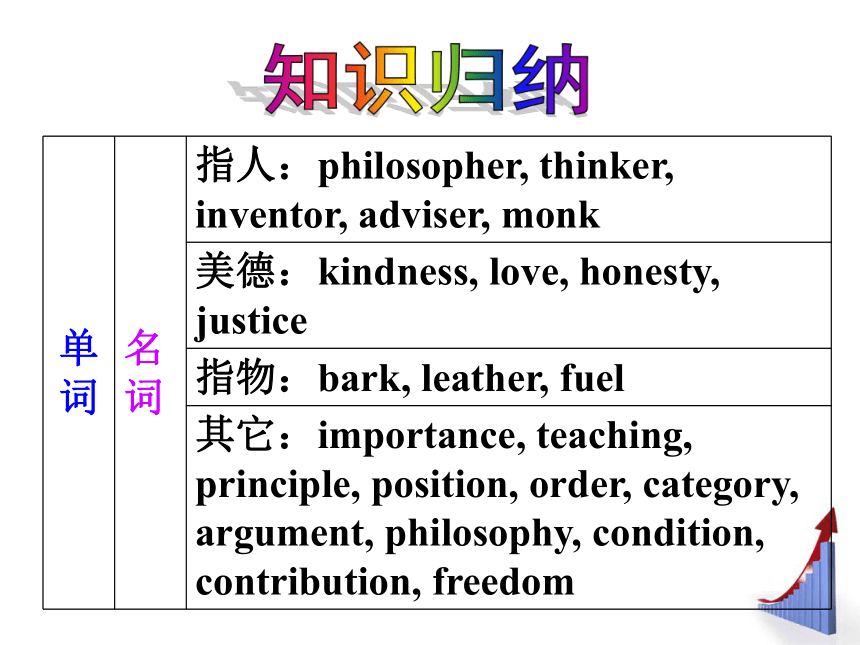
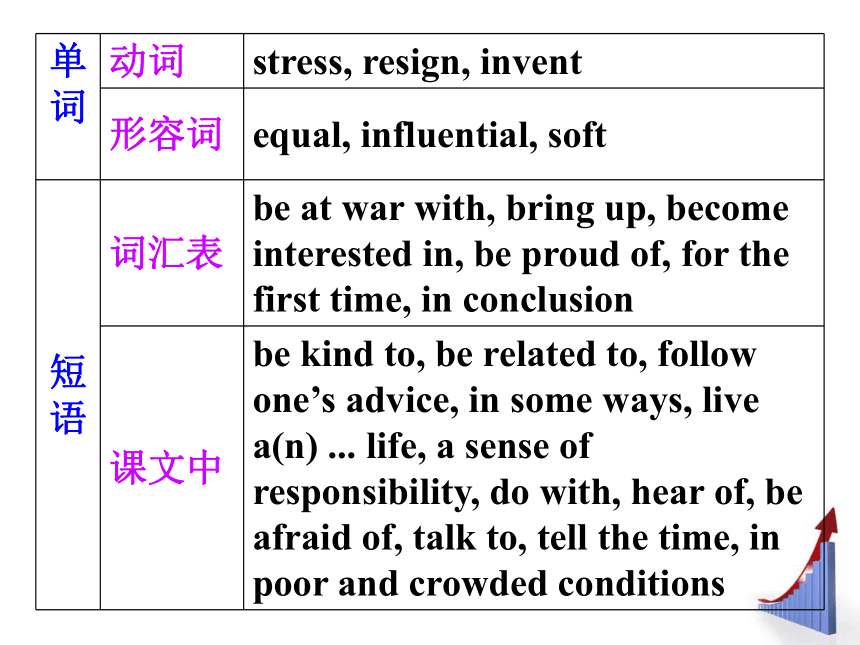
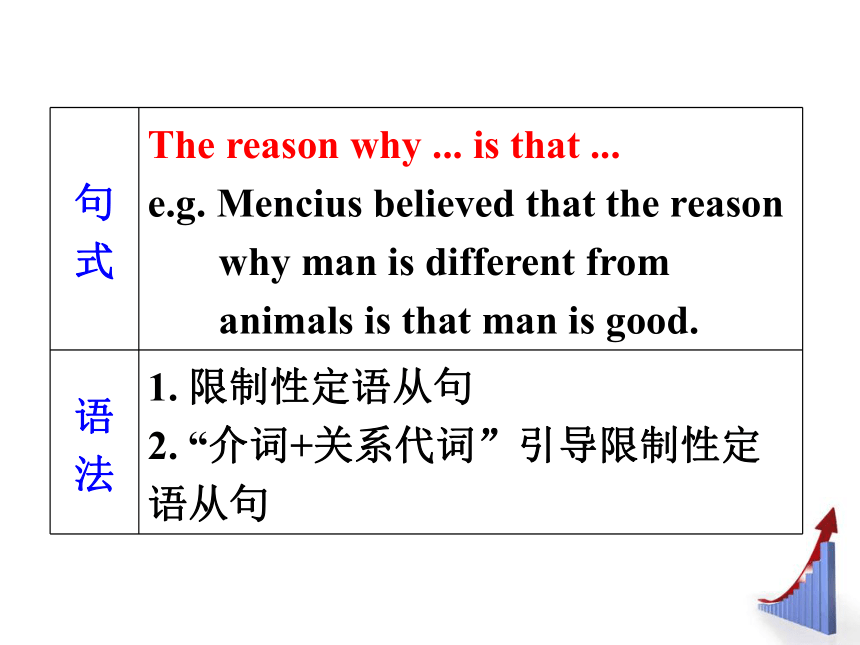
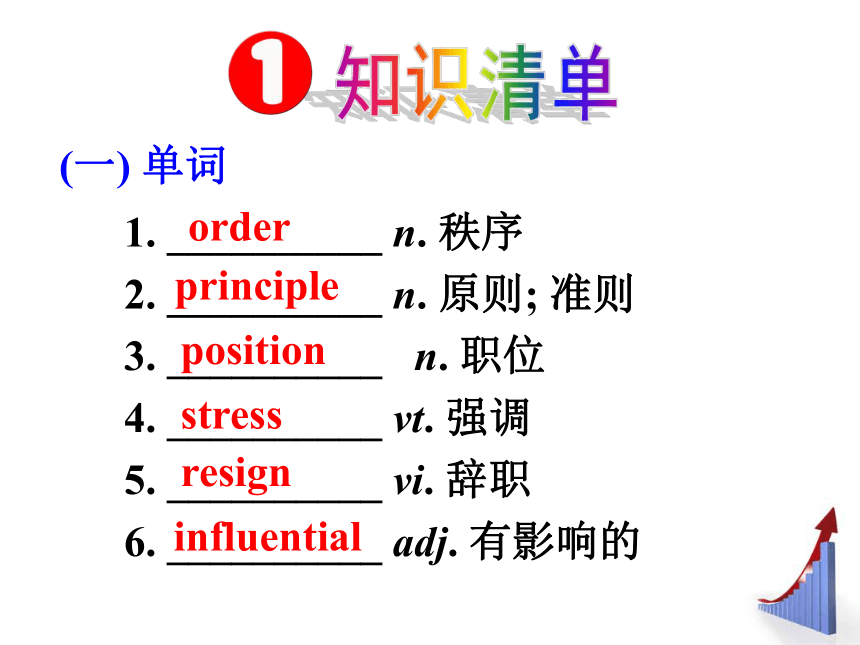
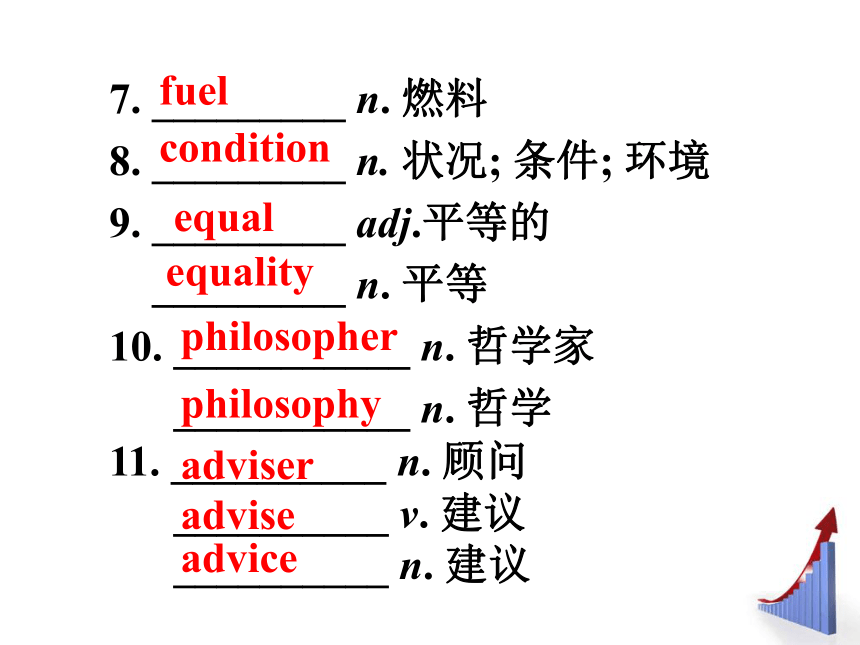
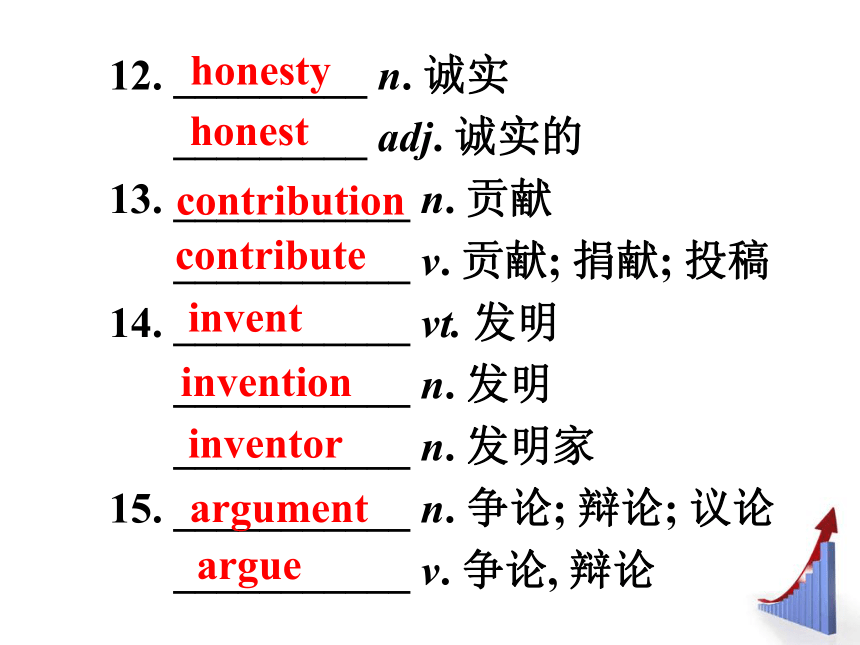
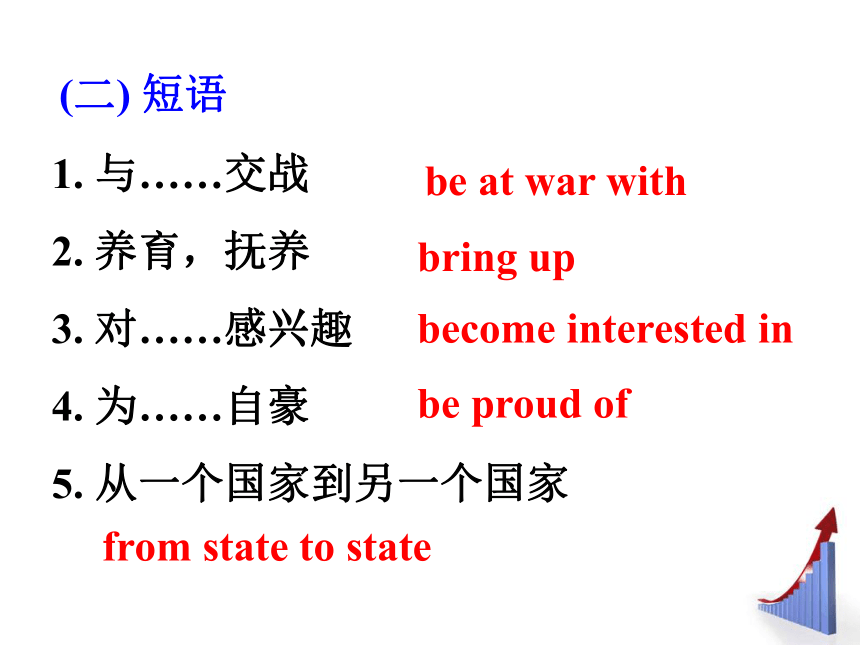

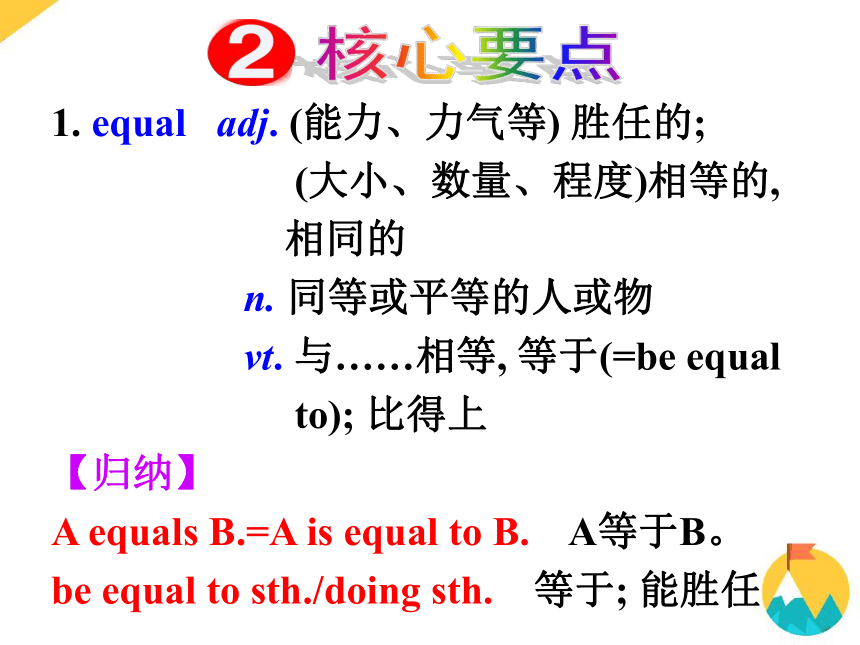
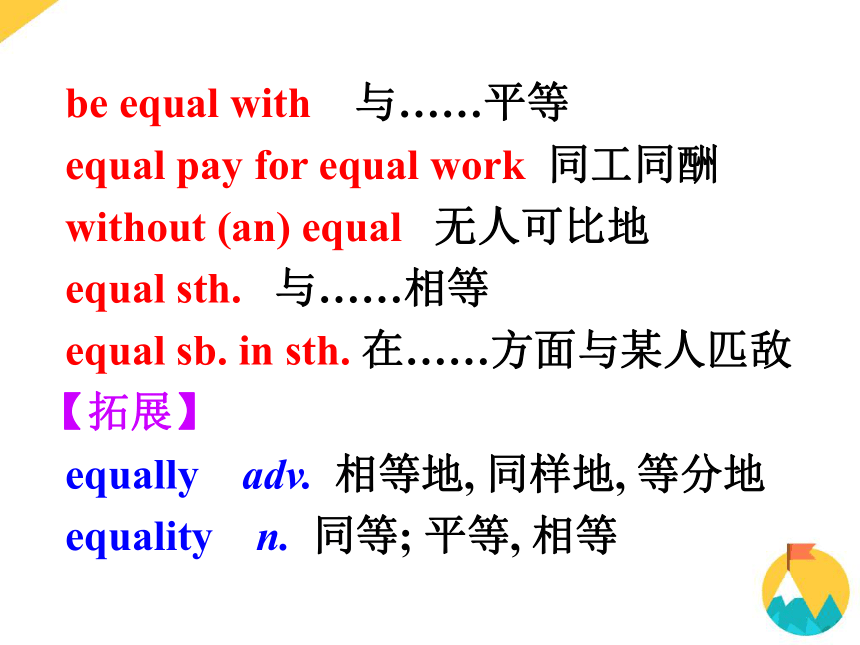
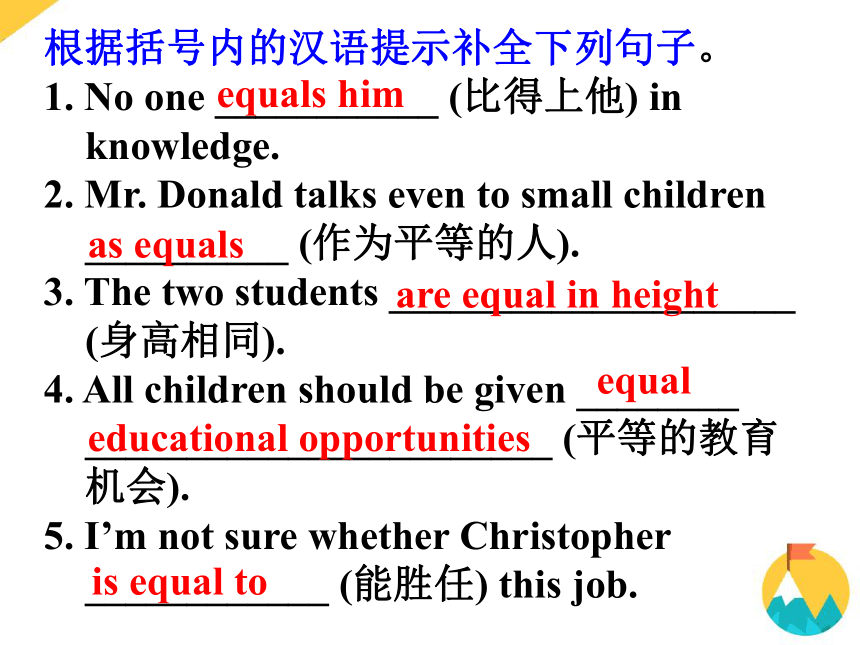
文档简介
课件60张PPT。Module 5
Great People and Great Inventions
of Ancient China知识归纳1. __________ n. 秩序
2. __________ n. 原则; 准则
3. __________ n. 职位
4. __________ vt. 强调
5. __________ vi. 辞职
6. __________ adj. 有影响的知识清单(一) 单词orderprinciplepositionstressresigninfluential7. _________ n. 燃料
8. _________ n. 状况; 条件; 环境
9. _________ adj.平等的
_________ n. 平等
10. ___________ n. 哲学家
___________ n. 哲学
11. __________ n. 顾问
__________ v. 建议
__________ n. 建议fuelconditionequalequalityphilosopherphilosophyadviseradviseadvice12. _________ n. 诚实
_________ adj. 诚实的
13. ___________ n. 贡献
___________ v. 贡献; 捐献; 投稿
14. ___________ vt. 发明
___________ n. 发明
___________ n. 发明家
15. ___________ n. 争论; 辩论; 议论
___________ v. 争论, 辩论honestyhonestcontributioncontributeinventinventioninventorargumentargue1. 与……交战
2. 养育,抚养
3. 对……感兴趣
4. 为……自豪
5. 从一个国家到另一个国家(二) 短语be at war withbring upbecome interested inbe proud offrom state to state6. 在某些方面
7. 总之
8. 第一次
9. 和……不同
10. 照顾in some waysin conclusionfor the first timebe different fromlook after1. equal adj. (能力、力气等) 胜任的;
(大小、数量、程度)相等的,
相同的
n. 同等或平等的人或物
vt. 与……相等, 等于(=be equal
to); 比得上
【归纳】
A equals B.=A is equal to B. A等于B。
be equal to sth./doing sth. 等于; 能胜任核心要点 be equal with 与……平等
equal pay for equal work 同工同酬
without (an) equal 无人可比地
equal sth. 与……相等
equal sb. in sth. 在……方面与某人匹敌
【拓展】
equally adv. 相等地, 同样地, 等分地
equality n. 同等; 平等, 相等根据括号内的汉语提示补全下列句子。
1. No one ___________ (比得上他) in knowledge.
2. Mr. Donald talks even to small children __________ (作为平等的人).
3. The two students ____________________ (身高相同).
4. All children should be given ________ _______________________ (平等的教育机会).
5. I’m not sure whether Christopher ____________ (能胜任) this job.equals him??as equals???? are equal in height???? equalis equal to educational opportunities???? 2. order n. 顺序; 点菜; 秩序; 命令; 订购
vt. 命令; 指令; 订购; 点菜; 安排; 指导
【归纳】
in order 按顺序,处于良好的状态
out of order 有毛病, 出故障; 不整洁
in running/working order 运转正常/良好
place an order for sth. 订购某物
give/take orders 下达/接受命令
in order to do.../that... 目的在于; 为了;
以便order sb. to do sth. 命令某人做某事
order + 宾语从句
(宾语从句中的谓语部分用“(should)+动词原形”)
order sb. sth./order sth. for sb.
为某人订购……从A、B、C、D四个选项中,选出可以填入
空白处的最佳选项。
1. The army has been sent in to keep _____ in the capital.
A. position ? ? ? ? ? ? ? ?B. order????????
C. campaign????? ?????? D. evidence
2. I want to place this _____, putting the largest first, then the next, and so on.
A. in order ? ? ? ? ? ? ? ?B. in use?????????
C. in trouble????? ?????? D. in need? BA 3. stress n. 强调, 重要性; 精社压力, 紧张
v. 强调; 重读
【归纳】
lay/place/put the stress on/upon...
把重点放在……上; 强调……重要性
under stress 在压力下
reduce stress 减少压力
【拓展】
stressful adj. 压力重的, 紧张的
stressed adj. 焦虑不安; 重读的翻译下列句子。
1. 在他的报告中,他强调了良好公共关系的重要性。
In his talk, he stressed the importance of good public relations.
2. Things can easily go wrong when people are under stress.
人在压力之下,办事就容易出差错。4. condition n. 状况, 状态; 健康状况;
(pl.) (居住、工作或做事情的)环境, 条件
【归纳】
living / housing / working conditions
居住/住房/工作条件
in good/poor condition
处于良好/不好的状态
under ... conditions 在……的条件下
on condition that ... 条件是…… (that引导
同位语从句)
on no condition 绝不 5. contribution n. 贡献; 捐款; 稿件
contribute vt. 作出贡献; 捐献; 撰稿
【归纳】
make contributions to (doing) sth.
对(做)某事作出了贡献
contribute to sth. 有助于某事, 有益于
contribute sth. to/towards
向……捐献某物; 向……投稿 用contribution的适当形式填空。
1. The organization ____________ aid for the needy families.
2. Each country should make ____________ to world peace.
3. The magazine with ____________ from well-known travel writers sells well.contributescontributionscontributions 6. bring up 抚养大, 教养; 提出; 呕吐
【拓展】
bring about 造成, 引起
bring in 引入, 赚得
bring out 使显现, 阐明, 出版, 生产
bring back 归还,使……回想起
bring down使降低,打倒,击落
bring on 引起,使提高用适当的副词填空。
1. I know it happened, but I cannot bring it _____ to my mind.
2. She brought _____ her children to be considerate of others.
3. With one shot he brought _____ the tiger.
4. Our teacher will bring a new book _____ next month.backup?downout7. in some ways 在某些方面
【拓展】
all the way 一路上; 自始至终
by the way 顺便提一下
in a way 在某种程度上
in the/one’s way 挡道; 妨碍
in no way 决不
on the way to 在去……途中; 即将;
将要根据汉语意思补全下列句子。
1. 汤姆在某些方面比迈克更好。
Tom _______________ Mike ________ __________.
2. 我想她是以她特有的方式爱你。
I think she ________________________ .is better thanloves you in her own wayin someways 8. in conclusion 总之;最后;最终
【拓展】
reach/draw/come to/arrive at a conclusion
得出结论;告一段落
at the conclusion of 当 ……完结时
bring sth. to a conclusion
使结束; 谈定(买卖等)
come to the conclusion that...
所得的结论是……; 断定Exercises根据提示写出所缺单词的正确形式。
1. Fitness is important in sport, but of at least ________ (平等的) importance are skills.
2. The names are listed in alphabetical (按字母顺序的) o________.
3. It is a matter of ________ (原则) with her to answer her children’s questions honestly. equal?order? ?principle4. People under s________ may experience headaches, minor pains and sleeping difficulties.
5. He was allowed to go out, but his parents made it a(n) ________ (条件) that he should get home before midnight. stresscondition??选用方框内合适的短语并用其正确形式填
空(每个短语限用一次)。
1. Lucy was __________ by her grandparents and educated at the local school.
2. Of course, she __________ having a friend of such noble character.
3. If you ________________ modern Chinese art, there’s a place you must go to: 798 Art Zone.be interested in, bring up, in conclusion, be proud of,? for the first timebrought upis proud of?are interested in4. _____________, I should like to thank all those who have worked so hard to bring about this result.
5. The twin sisters, separated by a lifetime and an ocean, were reunited last week in Southern California ________________?since birth.In conclusion?for the first timebe interested in, bring up, in conclusion, be proud of,? for the first time句式1. He spent his last years preparing a book of his teachings called The Book of Mencius.
他晚年写了一本介绍他思想的书, 名为《孟子》。
主语 + spend + n. (时间、金钱) + on sth. /(in) doing…spend表示“花费”时, 其主语必须是人, 宾语可以是时间、金钱、精力等名词,其后跟on+名词或 in + doing, 其中in可以省略。如:
He spent half his money on books.
I am going to spend my summer vocation writing a book.【拓展】
It takes/took sb. some time to do…
It costs/cost sb. some time.
sb. pays/paid some money for sth.
sth. costs/cost sb. some money.2. Mencius believed that the reason why man is different from animals is that man is good.
孟子认为, 人之所以不同于动物, 是因为人性本善。
reason用作先行词时, 常被关系副词why引导的定语从句修饰, that引导的从句是表语从句, 不能换成because。句型意为“……的原因, 是因为……”。如:
The reason why he didn’t come to school was that he was ill.语法定语从句是在复合句中起定语作用,修饰某个名词、代词或整个主句的从句。引导定语从句的有关系代词that, which, who, whom, whose和关系副词where, when, why等。关系代词与关系副词的选用根据先行词在从句中的成分来确定,关系代词在定语从句中可用作主语、宾语或定语,而关系副词在定语从句中只用作状语。 一、关系代词注意:
★通常使用that引导定语从句而不用which的情况:
①当先行词为all, everything, anything, nothing, much, little, none等不定代词或先行词被only, few, little, no, all, every, very等词修饰时。如:
Don’t believe everything that he tells you.
All the presents that your friends give you on your birthday should be put away.②当先行词同时包括人和物时。如:
Then they talked about the persons and things that interested them.
③当先行词前有序数词或形容词的最高级修饰时。如:
The first thing that must be done now is to clean up the room.
Mount Huangshan is one of the most beautiful mountains in China that I’ve ever visited.★介词放在关系代词前面时,关系代词只能用which代物,用whom代人。其中介词的选择一般取决于先行词的习惯搭配或从句中的动词、形容词等的习惯搭配以及主从句的意义。如:
I finished reading the book in which the 13-year-old boy describes his life.
The girl with whom you talked at the meeting is a college student.二、关系副词注意:关系副词when, where, why在意义上都相当于一个“介词+ which”结构。如:
I will never forget the day when / on which I joined the English Club.
Is this the village where / in which the famous scientist was born?
Sarah didn’t give the reason why / for which she was late for school again.用适当的关系词填空。
Tai Dong is a small city in southeast Taiwan 1. ________ I grew up. My family moved there from Taipei the summer 2. ________ I was born. The house in 3. ________ I grew up is on a main street in Tai Dong. My father sold tea, and my mother had a small restaurant across from our house. A cousin of mine 4. ________ family I visited every summer lived with us. wherewhen?? which?whose????He was an apprentice (学徒) 5. ________________ my father was teaching the tea business to. On the first floor of our house we had a huge kitchen 6. ________ we all gathered for dinner. The bedrooms were upstairs. My brother and my cousin slept in one bedroom. I slept in another 7. _________ I shared with Polly, the smartest bird 8. ______ I had ever seen.whom / who / thatwherewhich / thatthat如何描述一位成功的人物写作文体介绍
此类写作是记叙文体的一种,主要以人物为中心组织材料,围绕这个人物来写。写作技巧
在描述一位成功的人物时,首先要列出你想要描述的人物的一些个性特征及能体现这些特征的事例。然后再列出一些适合描述这位人物的词汇以帮助组织材料与写作。
第一段:介绍人物的出生年月、地点或家庭背景。
第二段:列举人物的主要经历、事迹和成就;
第三段:人们对该人物的评价或你的个人感受。人称:一般使用第三人称;
时态:文章以一般过去时或一般现在时为主。 常见表达
1. ... was born in / into a poor / rich family, ... family was so poor that ..., the child of a poor family, when ... was young, as a child of ..., spend one’s childhood in ...2. graduate from, when at college, ... majored in ...
3. good-looking, ordinary-looking, kind-hearted, near-sighted, far-sighted, strong-willed, wise, bright, diligent, healthy, humorous, charming, attractive ...4. be fond of ..., work hard at ..., win first prize, receive / obtain / win the Nobel Prize for ..., set a new world record of ..., be selected to, have a talent for language ...
5. one of the best, most important ..., set a good example to ..., ... is the pride of ..., make great contributions to ..., be regarded as ...巩固练习用“介词+关系代词”将下列两个句子合成一
个含有定语从句的复合句。
1. Lucy has now moved back to the house on Long Island. She was born there.
2. The star is to be named after Patrick Jenks. It was discovered by him.Lucy has now moved back to the house on Long Island in which she was born.The star is to be named after Patrick Jenks by whom it was discovered.3. The book is enjoyed by adults as well as children. It was primarily written for children.
4. There are still many things in our solar system. We know nothing about them.The book is enjoyed by adults as well as children for whom it was primarily written.There are still many things in our solar system about which we know nothing.阅读下面材料,在空白处填入适当的内容(不多于3个单词)或括号内单词的正确形式。
?????? Many things that are taken for granted today were invented long ago in Ancient China. An everyday plaything like the kite was used for 1. ________ first time in China more than 3,000 years ago; the umbrella appeared during the Wei Dynasty (386-534) and was used as protection 2. ________ both the rain and the sun. the ?from? ???China is, of course, famous for gunpowder and paper, which, along with the invention and development of printing, 3. __________ (allow) the words of great philosophers and thinkers throughout the world 4. ______________ (preserve). The Chinese first started weaving silk some 2,100 years ago. China is still the largest 5. ________ (produce) of silk today. has allowedto be preservedproducer?????? Another Chinese invention, porcelain, was 6. ________ (high) prized throughout the world for its beauty. It was invented during the Sui Dynasty (581-618) and perfected during the Tang (618-907), most notably by Tao Yue, 7. ________ used white clay from the edge of the Yangtze River. highly?whoProduction reached its peak during the Song Dynasty (960-1279), by 8. ________ time everyone had become interested in how 9. ____ was made, which was a closely held secret. It was in the 1700s that a way of 10. ________ (make) it was developed in Europe.which ?it?making1. These authors ___________________ (没有花费时间) on analysis of philosophy.
2. ___________________________________ _______________ (这所大学能够存在并发展的原因) lies in its constant adaptation to the society and self-regulation system.根据括号内所给的汉语提示补全下列句子。The reason why the university can exist
and develop??spent / spend no time??从A、B、C、D四个选项中,选出可
以填入空白处的最佳选项。
1. Care of the soul is a gradual process _____ even the small details of life should be considered.
A. what?????????? ???????? B. in what???????????
C. which ? ? ? ? ? ? ? ? ?D. in which2. We live in an age _____ more information is available with greater ease than ever before.
A. why ? ? ? ? ? ? ? ? ? ? ? B. when??
C. to whom ? ? ? ? ? ? ? ?D. on which?
3. Anyone, whether he is an official or a
bus driver, should be _____ respected.
A. especially ? ? ? ? ? ? ?B. equally?
C. naturally ? ? ? ? ? ? ? ?D. normally 4. Born into a family with three brothers, David was _____ to value the sense of sharing.
A. brought up ? ? ? ? ? B. turned down????
C. looked after ? ? ? ? ? D. held back
Great People and Great Inventions
of Ancient China知识归纳1. __________ n. 秩序
2. __________ n. 原则; 准则
3. __________ n. 职位
4. __________ vt. 强调
5. __________ vi. 辞职
6. __________ adj. 有影响的知识清单(一) 单词orderprinciplepositionstressresigninfluential7. _________ n. 燃料
8. _________ n. 状况; 条件; 环境
9. _________ adj.平等的
_________ n. 平等
10. ___________ n. 哲学家
___________ n. 哲学
11. __________ n. 顾问
__________ v. 建议
__________ n. 建议fuelconditionequalequalityphilosopherphilosophyadviseradviseadvice12. _________ n. 诚实
_________ adj. 诚实的
13. ___________ n. 贡献
___________ v. 贡献; 捐献; 投稿
14. ___________ vt. 发明
___________ n. 发明
___________ n. 发明家
15. ___________ n. 争论; 辩论; 议论
___________ v. 争论, 辩论honestyhonestcontributioncontributeinventinventioninventorargumentargue1. 与……交战
2. 养育,抚养
3. 对……感兴趣
4. 为……自豪
5. 从一个国家到另一个国家(二) 短语be at war withbring upbecome interested inbe proud offrom state to state6. 在某些方面
7. 总之
8. 第一次
9. 和……不同
10. 照顾in some waysin conclusionfor the first timebe different fromlook after1. equal adj. (能力、力气等) 胜任的;
(大小、数量、程度)相等的,
相同的
n. 同等或平等的人或物
vt. 与……相等, 等于(=be equal
to); 比得上
【归纳】
A equals B.=A is equal to B. A等于B。
be equal to sth./doing sth. 等于; 能胜任核心要点 be equal with 与……平等
equal pay for equal work 同工同酬
without (an) equal 无人可比地
equal sth. 与……相等
equal sb. in sth. 在……方面与某人匹敌
【拓展】
equally adv. 相等地, 同样地, 等分地
equality n. 同等; 平等, 相等根据括号内的汉语提示补全下列句子。
1. No one ___________ (比得上他) in knowledge.
2. Mr. Donald talks even to small children __________ (作为平等的人).
3. The two students ____________________ (身高相同).
4. All children should be given ________ _______________________ (平等的教育机会).
5. I’m not sure whether Christopher ____________ (能胜任) this job.equals him??as equals???? are equal in height???? equalis equal to educational opportunities???? 2. order n. 顺序; 点菜; 秩序; 命令; 订购
vt. 命令; 指令; 订购; 点菜; 安排; 指导
【归纳】
in order 按顺序,处于良好的状态
out of order 有毛病, 出故障; 不整洁
in running/working order 运转正常/良好
place an order for sth. 订购某物
give/take orders 下达/接受命令
in order to do.../that... 目的在于; 为了;
以便order sb. to do sth. 命令某人做某事
order + 宾语从句
(宾语从句中的谓语部分用“(should)+动词原形”)
order sb. sth./order sth. for sb.
为某人订购……从A、B、C、D四个选项中,选出可以填入
空白处的最佳选项。
1. The army has been sent in to keep _____ in the capital.
A. position ? ? ? ? ? ? ? ?B. order????????
C. campaign????? ?????? D. evidence
2. I want to place this _____, putting the largest first, then the next, and so on.
A. in order ? ? ? ? ? ? ? ?B. in use?????????
C. in trouble????? ?????? D. in need? BA 3. stress n. 强调, 重要性; 精社压力, 紧张
v. 强调; 重读
【归纳】
lay/place/put the stress on/upon...
把重点放在……上; 强调……重要性
under stress 在压力下
reduce stress 减少压力
【拓展】
stressful adj. 压力重的, 紧张的
stressed adj. 焦虑不安; 重读的翻译下列句子。
1. 在他的报告中,他强调了良好公共关系的重要性。
In his talk, he stressed the importance of good public relations.
2. Things can easily go wrong when people are under stress.
人在压力之下,办事就容易出差错。4. condition n. 状况, 状态; 健康状况;
(pl.) (居住、工作或做事情的)环境, 条件
【归纳】
living / housing / working conditions
居住/住房/工作条件
in good/poor condition
处于良好/不好的状态
under ... conditions 在……的条件下
on condition that ... 条件是…… (that引导
同位语从句)
on no condition 绝不 5. contribution n. 贡献; 捐款; 稿件
contribute vt. 作出贡献; 捐献; 撰稿
【归纳】
make contributions to (doing) sth.
对(做)某事作出了贡献
contribute to sth. 有助于某事, 有益于
contribute sth. to/towards
向……捐献某物; 向……投稿 用contribution的适当形式填空。
1. The organization ____________ aid for the needy families.
2. Each country should make ____________ to world peace.
3. The magazine with ____________ from well-known travel writers sells well.contributescontributionscontributions 6. bring up 抚养大, 教养; 提出; 呕吐
【拓展】
bring about 造成, 引起
bring in 引入, 赚得
bring out 使显现, 阐明, 出版, 生产
bring back 归还,使……回想起
bring down使降低,打倒,击落
bring on 引起,使提高用适当的副词填空。
1. I know it happened, but I cannot bring it _____ to my mind.
2. She brought _____ her children to be considerate of others.
3. With one shot he brought _____ the tiger.
4. Our teacher will bring a new book _____ next month.backup?downout7. in some ways 在某些方面
【拓展】
all the way 一路上; 自始至终
by the way 顺便提一下
in a way 在某种程度上
in the/one’s way 挡道; 妨碍
in no way 决不
on the way to 在去……途中; 即将;
将要根据汉语意思补全下列句子。
1. 汤姆在某些方面比迈克更好。
Tom _______________ Mike ________ __________.
2. 我想她是以她特有的方式爱你。
I think she ________________________ .is better thanloves you in her own wayin someways 8. in conclusion 总之;最后;最终
【拓展】
reach/draw/come to/arrive at a conclusion
得出结论;告一段落
at the conclusion of 当 ……完结时
bring sth. to a conclusion
使结束; 谈定(买卖等)
come to the conclusion that...
所得的结论是……; 断定Exercises根据提示写出所缺单词的正确形式。
1. Fitness is important in sport, but of at least ________ (平等的) importance are skills.
2. The names are listed in alphabetical (按字母顺序的) o________.
3. It is a matter of ________ (原则) with her to answer her children’s questions honestly. equal?order? ?principle4. People under s________ may experience headaches, minor pains and sleeping difficulties.
5. He was allowed to go out, but his parents made it a(n) ________ (条件) that he should get home before midnight. stresscondition??选用方框内合适的短语并用其正确形式填
空(每个短语限用一次)。
1. Lucy was __________ by her grandparents and educated at the local school.
2. Of course, she __________ having a friend of such noble character.
3. If you ________________ modern Chinese art, there’s a place you must go to: 798 Art Zone.be interested in, bring up, in conclusion, be proud of,? for the first timebrought upis proud of?are interested in4. _____________, I should like to thank all those who have worked so hard to bring about this result.
5. The twin sisters, separated by a lifetime and an ocean, were reunited last week in Southern California ________________?since birth.In conclusion?for the first timebe interested in, bring up, in conclusion, be proud of,? for the first time句式1. He spent his last years preparing a book of his teachings called The Book of Mencius.
他晚年写了一本介绍他思想的书, 名为《孟子》。
主语 + spend + n. (时间、金钱) + on sth. /(in) doing…spend表示“花费”时, 其主语必须是人, 宾语可以是时间、金钱、精力等名词,其后跟on+名词或 in + doing, 其中in可以省略。如:
He spent half his money on books.
I am going to spend my summer vocation writing a book.【拓展】
It takes/took sb. some time to do…
It costs/cost sb. some time.
sb. pays/paid some money for sth.
sth. costs/cost sb. some money.2. Mencius believed that the reason why man is different from animals is that man is good.
孟子认为, 人之所以不同于动物, 是因为人性本善。
reason用作先行词时, 常被关系副词why引导的定语从句修饰, that引导的从句是表语从句, 不能换成because。句型意为“……的原因, 是因为……”。如:
The reason why he didn’t come to school was that he was ill.语法定语从句是在复合句中起定语作用,修饰某个名词、代词或整个主句的从句。引导定语从句的有关系代词that, which, who, whom, whose和关系副词where, when, why等。关系代词与关系副词的选用根据先行词在从句中的成分来确定,关系代词在定语从句中可用作主语、宾语或定语,而关系副词在定语从句中只用作状语。 一、关系代词注意:
★通常使用that引导定语从句而不用which的情况:
①当先行词为all, everything, anything, nothing, much, little, none等不定代词或先行词被only, few, little, no, all, every, very等词修饰时。如:
Don’t believe everything that he tells you.
All the presents that your friends give you on your birthday should be put away.②当先行词同时包括人和物时。如:
Then they talked about the persons and things that interested them.
③当先行词前有序数词或形容词的最高级修饰时。如:
The first thing that must be done now is to clean up the room.
Mount Huangshan is one of the most beautiful mountains in China that I’ve ever visited.★介词放在关系代词前面时,关系代词只能用which代物,用whom代人。其中介词的选择一般取决于先行词的习惯搭配或从句中的动词、形容词等的习惯搭配以及主从句的意义。如:
I finished reading the book in which the 13-year-old boy describes his life.
The girl with whom you talked at the meeting is a college student.二、关系副词注意:关系副词when, where, why在意义上都相当于一个“介词+ which”结构。如:
I will never forget the day when / on which I joined the English Club.
Is this the village where / in which the famous scientist was born?
Sarah didn’t give the reason why / for which she was late for school again.用适当的关系词填空。
Tai Dong is a small city in southeast Taiwan 1. ________ I grew up. My family moved there from Taipei the summer 2. ________ I was born. The house in 3. ________ I grew up is on a main street in Tai Dong. My father sold tea, and my mother had a small restaurant across from our house. A cousin of mine 4. ________ family I visited every summer lived with us. wherewhen?? which?whose????He was an apprentice (学徒) 5. ________________ my father was teaching the tea business to. On the first floor of our house we had a huge kitchen 6. ________ we all gathered for dinner. The bedrooms were upstairs. My brother and my cousin slept in one bedroom. I slept in another 7. _________ I shared with Polly, the smartest bird 8. ______ I had ever seen.whom / who / thatwherewhich / thatthat如何描述一位成功的人物写作文体介绍
此类写作是记叙文体的一种,主要以人物为中心组织材料,围绕这个人物来写。写作技巧
在描述一位成功的人物时,首先要列出你想要描述的人物的一些个性特征及能体现这些特征的事例。然后再列出一些适合描述这位人物的词汇以帮助组织材料与写作。
第一段:介绍人物的出生年月、地点或家庭背景。
第二段:列举人物的主要经历、事迹和成就;
第三段:人们对该人物的评价或你的个人感受。人称:一般使用第三人称;
时态:文章以一般过去时或一般现在时为主。 常见表达
1. ... was born in / into a poor / rich family, ... family was so poor that ..., the child of a poor family, when ... was young, as a child of ..., spend one’s childhood in ...2. graduate from, when at college, ... majored in ...
3. good-looking, ordinary-looking, kind-hearted, near-sighted, far-sighted, strong-willed, wise, bright, diligent, healthy, humorous, charming, attractive ...4. be fond of ..., work hard at ..., win first prize, receive / obtain / win the Nobel Prize for ..., set a new world record of ..., be selected to, have a talent for language ...
5. one of the best, most important ..., set a good example to ..., ... is the pride of ..., make great contributions to ..., be regarded as ...巩固练习用“介词+关系代词”将下列两个句子合成一
个含有定语从句的复合句。
1. Lucy has now moved back to the house on Long Island. She was born there.
2. The star is to be named after Patrick Jenks. It was discovered by him.Lucy has now moved back to the house on Long Island in which she was born.The star is to be named after Patrick Jenks by whom it was discovered.3. The book is enjoyed by adults as well as children. It was primarily written for children.
4. There are still many things in our solar system. We know nothing about them.The book is enjoyed by adults as well as children for whom it was primarily written.There are still many things in our solar system about which we know nothing.阅读下面材料,在空白处填入适当的内容(不多于3个单词)或括号内单词的正确形式。
?????? Many things that are taken for granted today were invented long ago in Ancient China. An everyday plaything like the kite was used for 1. ________ first time in China more than 3,000 years ago; the umbrella appeared during the Wei Dynasty (386-534) and was used as protection 2. ________ both the rain and the sun. the ?from? ???China is, of course, famous for gunpowder and paper, which, along with the invention and development of printing, 3. __________ (allow) the words of great philosophers and thinkers throughout the world 4. ______________ (preserve). The Chinese first started weaving silk some 2,100 years ago. China is still the largest 5. ________ (produce) of silk today. has allowedto be preservedproducer?????? Another Chinese invention, porcelain, was 6. ________ (high) prized throughout the world for its beauty. It was invented during the Sui Dynasty (581-618) and perfected during the Tang (618-907), most notably by Tao Yue, 7. ________ used white clay from the edge of the Yangtze River. highly?whoProduction reached its peak during the Song Dynasty (960-1279), by 8. ________ time everyone had become interested in how 9. ____ was made, which was a closely held secret. It was in the 1700s that a way of 10. ________ (make) it was developed in Europe.which ?it?making1. These authors ___________________ (没有花费时间) on analysis of philosophy.
2. ___________________________________ _______________ (这所大学能够存在并发展的原因) lies in its constant adaptation to the society and self-regulation system.根据括号内所给的汉语提示补全下列句子。The reason why the university can exist
and develop??spent / spend no time??从A、B、C、D四个选项中,选出可
以填入空白处的最佳选项。
1. Care of the soul is a gradual process _____ even the small details of life should be considered.
A. what?????????? ???????? B. in what???????????
C. which ? ? ? ? ? ? ? ? ?D. in which2. We live in an age _____ more information is available with greater ease than ever before.
A. why ? ? ? ? ? ? ? ? ? ? ? B. when??
C. to whom ? ? ? ? ? ? ? ?D. on which?
3. Anyone, whether he is an official or a
bus driver, should be _____ respected.
A. especially ? ? ? ? ? ? ?B. equally?
C. naturally ? ? ? ? ? ? ? ?D. normally 4. Born into a family with three brothers, David was _____ to value the sense of sharing.
A. brought up ? ? ? ? ? B. turned down????
C. looked after ? ? ? ? ? D. held back
